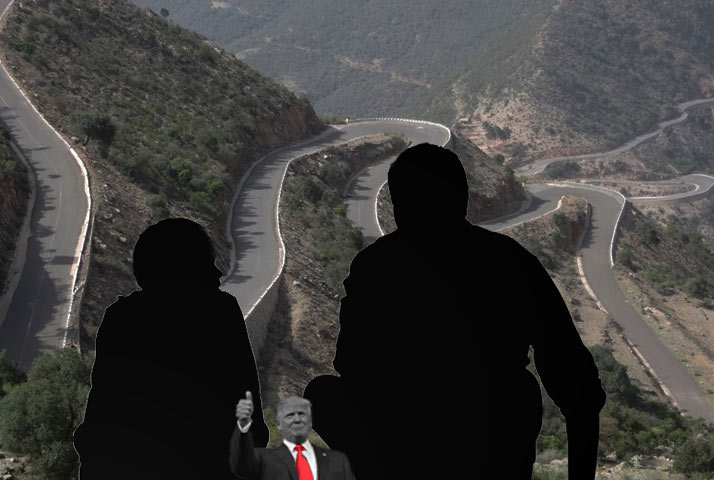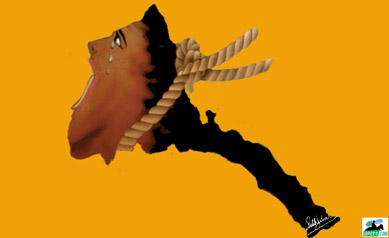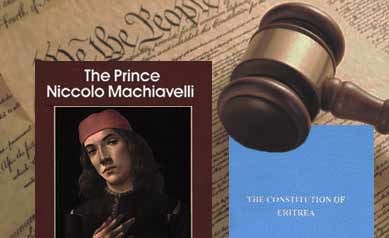Sanctions: A Prelude to Hague, the Netherlands
One the early morning in a chilly winter day, at a hamlet in the highlands of Eritrea, an wise old man parts his son with the following wishes: hawi bizuhat ayendidka, ganzeb bizuhat ayebl’eka (may you stay safe from the fires of many and may you be saved from the craving to swindle funds from many). No wonder. If he were alive today, he would have probably added: mis be’al haki ayeba’eska (may you never be a position of confrontation with one who demands a just rights). This sober-minded old man pointed to his son the risk of fires that turns one to ashes, an appalling loss.
The regime thought it would prevail by practicing injustices. For some time, it deceived the Eritrean people and the international community, but now it has reached a deadlock—the cord of lies is short (habl alkizib kessir), as the Sudanese would say describing a similar situations.
The sanctions has exposed the dictator and his regime to the surface. In the course of his yearly ajewjew, he unmasked the source of his knowledge, his system of governance and the criteria he applies in selecting his ministers, military generals and his closest senior cadres. The main source of his knowledge is publications that have relevance with secret police stories, theft, deception, and bela-belew (tittle-tattle) from outside the instrumental circles. The system of governance the dictator applies to the Eritrean people, including his followers, is divide and rule.
Most of the factors that contributed in bringing the dictator to his current position, has failed him. The only instrument that remains to gain him supporters is limited to devious financial methods. Owning financial leverage facilitates his bribing schemes to bring along as many people as he can to stand on his side. This is the key reason that makes the regime collect money from people with voracity to satisfy its requirements—without any dread from defamation, illegality or taking into consideration the circumstances of the citizens who are required to pay the money.
In his speech, the dictator mentions the kinds of books he reads to give the impression that he is well-versed and the only qualified person in the country. Here, one may ask an innocent question: What is the importance of the books Isaias reads to the people of Eritrea? He points out to some wide topics that he attempts to cover in a single interview. He speaks about regional and international problems, in detail, to influence his listeners that he knows much about the secrets of the world, beyond the expectation of his listeners. The message is very clear: he wants to say that he is the most skilled leader in the world. Why does he behave in such a way?
When asked that his cadres about Somalia, “let it be fractured, why should we care? He despised their opinion and said: cadir ilka de’ahhh … and then lectured in detail how his cadres should calculate operations and assess results before executing any plan.
This is an example of the lessons he gets from the secret police stories he reads. Here, Isaias illustrates that he is the sole person who thinks smartly while his senior cadres lack the fundamentals of rationality; he depicted them as empty barrels in a new form—cadir ilka de’ahhh!
Why does Isaias depicts his senior cadres as empty barrels or persons who lack the basics of rationality? Who has chosen these senior cadres? Why does he select irrational cadres? Is choosing irrational cadres for the interest of the Eritrean people?
This guides us to investigate in the criteria he employs in selecting his senior cadres, which fortunately, he implicitly indicated in his interview with the aim of defaming the opponents of his regime.
In illustrating the criteria with which he selects his cadres, the dictator said that he looks for weak persons who have an inclination to be corrupted by money and bribe them to be agents of the regime. But he concealed an important criterion in the selection of his high-ranking cadres for reasons that may have a direct relevance to his personality. Are the words empty barrels and cadir ilka de’ahhh the key words to understand the personality of Isaias and his senior cadres? Why does he go out of his way to demonstrate that he is a well-versed person?
The above observations leads to more questions, specially when one reads observations published at asmarino.com on 11 December 2009, by Mr. Louis Michel (MEP ALDE) Co-President of the ACP-EU JPA, and former Commissioner for Development and Humanitarian Aid at the EC, who described his talk with Isaias as:
“…a monologue rather than a dialogue. He lives in a state of mind which suffers from utter denial of objective reality, rejecting real problems on the ground and saying that everything is alright. He thinks everybody is against him. The man talks a lot and once he starts talking he doesn’t want to stop.”
Is Isaias a politicized parrot? Why does Isaias apply abduction and assassination in dealing with his opponents, something he has been doing since the seventies? Why does he assassinate unwanted senior cadres? Can we call him a man without options? Why does he like to be interviewed only to evade press conference by international media? Why does he avoid public meetings outside Eritrea? Why does he like disguised operations? Why does he always lie? What is the reason of his fear? What is the reality he hides? Why does he become embarrassed when he is interviewed by a smiling, open-minded journalist? Does he suffer from the consequences of his childhood, when friends and colleagues laughed at him? If that was so, then, why did they laugh at him? There are many questions that require answers. It is better to leave the job of studying Isaias’ personality behavioral psycologists. I am afraid the followers of the regime implicated the people of Eritrea with a person who suffers from a serious mental defect.
This mentally jerked man, who shoots in all directions, governs Eritrea using the divide and rule policy which becomes evident in his partition of the Eritrean teachers into rural and urban teachers. Why did he divide the teachers in such a way? Does he really want to solve the problems of rural schools teachers or the policy up is a strategy of protecting for the regime? The salaries teachers receive, whether those in the urban or rural areas, do not make the two ends to meet. All the teachers in Eritrea live in a bad condition.
The dictator doesn’t intend to raise the salaries of all the teachers; he wants to recruit defenders for the regime, because he anticipates an uprising by the teachers and their students. This kind of uprising would ignite a rebellion of the entire people of Eritrea, therefore, he decided to split teachers to haves and have-nots. It appears, the Pharaoh dreads children. Is the next step of the Pharaoh a new kind of Sawa for children or contraception?
The dictator also revealed his intentions to build new houses. This project will empower him to distribute houses to some of his cadres to prevent them from rebelling against his regime. He foresees that the new houses will assist him in gaining more supporters to suppress the poor people of Eritrea. Here, the policy of divide and rule by way of bribing becomes more clear. It is a bee kingdom where only the queen and the males eat the honey.
The dictator, in his interview, attempted to influence the people of Eritrea that his decision for building new houses in all parts of Eritrea is to reward those who served his regime more than ten years, springs from his good governance. By this project, it is certain that he will deprive many Eritreans from their land in order to execute his partition program. He endeavors to polish his wicked deeds of divide and rule with rationality, but it is a clear act of partition except to those who blindly follow him. Beyond doubt, it is an act of empowering a select group over the entire people of Eritrea.
The houses that the regime intends to construct in selected areas of Eritrea require subsidization. The budget for building these houses are expected to be secured from contributions and tax payments of 2% by Diaspora Eritreans. It is a project for recruiting more instruments of suppression. By the way of this project, the regime craves to contain the segments that began to express their defiance against it in whispers. The regime believes that engaging more beneficiaries in the circle of the privileged followers will strengthen it, thus it is determined to raise salaries of rural area teachers and build new houses to reward its close supporters. The purpose of this strategy is to fortify the wearing regime.
In his first publicized reaction against the embargo, the dictator depicted the sanctions as a baseless, unjust and masterminded by the CIA to plunder the resources of Africa. He blended the sanctions with the history of the 20th century and the continent’s resources to make his lies palatable. He attempted to mislead the people by feigning the reasons of the embargo basing it on unfounded accusations regarding the problems of Somalia and Djibouti. He thought that our people forgot the havoc he has caused to their country and the region in the past two decades.
It is evident that all the practices of the regime—the exodus of the youth, thousands of prisoners in dungeons, suppressing of all rights, expelling of aid agencies, rallies held by the Eritrean communities, petitions sent to key countries and organizations—were apparent to the international community. All the abuses reported throughout the past two decades by many international and Eritrean human rights institutions, civic organizations and research centers were implicitly present in the discussions and at the time of voting for the resolution No. 1907 by the UNSC.
Usually, the actions of the international community increase in intensity over the time. For example: The European Union has employed an engagement policy, and the Americans advised the regime to shapeup its acts. The international community recognizes the abuses of the regime, but it called on the regime for several years to rectify its policies. The strategy of the EU and US was considered by many observers as incongruent with the cruelty and crimes of the regime. Though the international community understands the brutality of the regime, it endeavored to contain the regime mildly. At that time, these international measures were considered by human rights advocates and many Eritreans as methods far from what the regime deserves. When the regime refused to listen to the soft voices, the international community imposed the sanctions relying on transgressions that have relevance to the region; this doesn’t mean that the Eritrean people’s critical situation was far from the scene.
The next file that will be opened against the regime is the crimes perpetrated upon the people of Eritrea. The international community, before moving to the third stage, will have to watch at the crimes of the regime closely. At the next stage, the measures will be tougher because it is expected to tackle atrocities against humanity committed by the regime. At that stage, the United Nations Security council will assign special tribunal court or refer it to the International Criminal Court to prosecute the regime.
The dictator and his cohorts have tried to present the reasons of the sanctions as fabricated allegations. They missed to understand the embargo is the second move of the international community, and the tougher penalty will follow soon. It is certain, from the shock of the next harsher measures, the despot and his followers will crumble and become debris.
It was apparent in his yearly speech that the sanctions have moved Isaias to the crossroads. At present, he is in severe tension, waiting for the implementation of sanctions. This restless situation has made him declare his necessity to gather rumors (bela-belew) from his supporters around the world to formulate a strategy for the way forward. Haughtiness disappeared from the face of the dictator. He mentioned the noose of hanging several times, a clear indication of confusion, indecision and a walk towards the inescapable.
In his interview, the dictator appeared embarrassed. He seemed to have realized that the role of playing hero to quench the whims of his sectarian supporters has reached a deadlock. It is a situation where he is incapable of satisfying their greed. The man who was pretending to be a hero, well-versed and principled, is entangled in the traps of the international community. The man who is unapologetic, ravenous, careless, inhumane, unfriendless, cruel, merciless and dubious is now in a dilemma. At present, he conceives very well the exploitation of the youth in serfdom, the absurd wars, the hundreds of thousands of mistreated refugees, the imprisoned Eritreans, the maltreated parents and relatives of disappeared, the ill-treatment of the forcibly deported asylum seekers and the abused Eritreans around the world who will be the witnesses against him.
The way out from his current situation passes through kissing the hands, foreheads and feet of IGAD, the African Union, European Union, many international institutions, Human rights organizations around the world, the super powers and the United Nations Security Council. It is a confrontation with the entire world where the regime left no way open for retreat. It has reached a stage beyond any chances of modification and beautifying, for kissing siblings and distinguished foreign guests. Attempting to defend or repair the regime is a waste of time and a kind of insanity. The only place the members of the regime deserve is behind bars.
By now, without doubt, the dictator comprehends that the International Criminal Court is awaiting him impatiently. It is the aspirations of the Eritrean people to see the dictator sentenced at Aleksandr Pushkin Public Square in Asmara, and the regime disposed and thrown in the dustbin of history before the next move of the international community.




Awate Forum